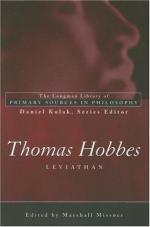|
This section contains 1,220 words (approx. 5 pages at 300 words per page) |

|
Thomas Hobbes, John Locke, and J.J. Rousseau
Summary: Discusses how the views of Thomas Hobbes, John Locke, and J.J. Rousseau on man impacted their philosophy of government.
Before communism, sophisticated political parties, and organizations such as the United Nations, there were Thomas Hobbes, John Locke, and Jean Jacque Rousseau. These political philosophers were significant to the Enlightenment. Through the seventeenth and eighteenth century, there were revolutionary ideas about the relationship with mankind and government. Thomas Hobbes' view of human nature as quarrelsome, as described in the "Leviathan", resulted in his encouragement of an absolute monarchy; John Locke's view of man's state of nature as morally good and free in "The Blank Slate of the Mind" and the "The Second Treatise" supports the limited monarchy, and Jean-Jacque Rousseau's view of a character influenced by society in the "Social Contract" impacted his ideas on the Sovereign Power.
Thomas Hobbes' opinion of man justified his theory of a government based on absolutism. He believed that men have grown to be equal although having different strengths. This equality has...
|
This section contains 1,220 words (approx. 5 pages at 300 words per page) |

|


